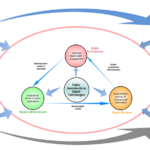Open data has been growing by leaps and bounds all around the globe – which is indeed welcome.
However, we should not forget that Open Data is sort of the “second wave” of the Freedom of information movement that rapidly started to expand in the 1990s. Nowadays, over 100 countries have legislation opening public information and giving people the right to demand access at any point in time. Nevertheless, most if not all freedom of information laws are focused on documents and text but very rarely mention or include data. Open Data fills that void and puts at the disposal of the general public a vast amount of public data that some how we, citizens of a given country, should be able to effectively digest to then engage with other stakeholders and with governments.
While the emphasis so far has been placed on both the tools and the business case for Open Data, issues related to local capacities, governance and instituti
Open data has been growing by leaps and bounds all around the globe – which is indeed welcome.
However, we should not forget that Open Data is sort of the “second wave” of the Freedom of information movement that rapidly started to expand in the 1990s. Nowadays, over 100 countries have legislation opening public information and giving people the right to demand access at any point in time. Nevertheless, most if not all freedom of information laws are focused on documents and text but very rarely mention or include data. Open Data fills that void and puts at the disposal of the general public a vast amount of public data that some how we, citizens of a given country, should be able to effectively digest to then engage with other stakeholders and with governments.
While the emphasis so far has been placed on both the tools and the business case for Open Data, issues related to local capacities, governance and institutionalization, and people’s participation in the process have been relegated to a second tier. As I see it, these issues are critical for most if not all developing countries. A focus on ICTs or innovation alone can easily ignore them and thus lead to serious issues on the implementation and long term sustainability of these initiatives – as it is actually happening in a few countries.
With this in mind, UNDP commissioned this study on Open Data in Brazil, one of the emerging nations and a core actor of “the rise of the South” trend. The study highlights some of the key development and governance issues that need to be addressed to successfully have both truly open governments and fully informed stakeholders who can effectively engage with the former.
The case study has been elaborated by Cesar Brod (@cesarbrod) who was part of the team in the Brazilian government that designed and launched the first Open Data portal in the country. He thus have first hand experience on Open Data and has gladly accepted my challenge of thinking about the larger development issues in the preparation of this research piece.
I am positive many other developing countries will benefit from the insights provided by this report.
The report is available here: https://www.undpegov.org/OD-Brazil
Cheers, Raúl
onalization, and people’s participation in the process have been relegated to a second tier. As I see it, these issues are critical for most if not all developing countries. A focus on ICTs or innovation alone can easily ignore them and thus lead to serious issues on the implementation and long term sustainability of these initiatives – as it is actually happening in a few countries.
With this in mind, UNDP commissioned this study on Open Data in Brazil, one of the emerging nations and a core actor of “the rise of the South” trend. The study highlights some of the key development and governance issues that need to be addressed to successfully have both truly open governments and fully informed stakeholders who can effectively engage with the former.
The case study has been elaborated by Cesar Brod (@cesarbrod) who was part of the team in the Brazilian government that designed and launched the first Open Data portal in the country. He thus have first hand experience on Open Data and has gladly accepted my challenge of thinking about the larger development issues in the preparation of this research piece.
I am positive many other developing countries will benefit from the insights provided by this report.
The report is available here: https://www.undpegov.org/OD-Brazil
Cheers, Raúl





